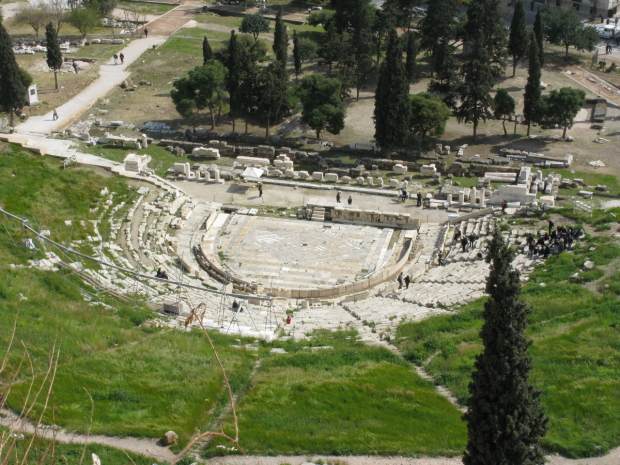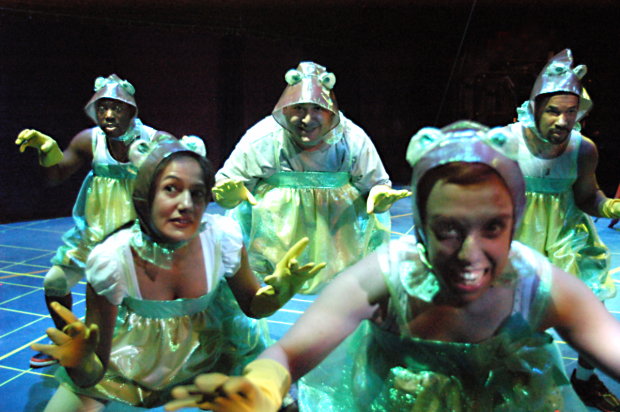Today, Would Aristophanes Tweet? (Part II)
When did the theater start ruffling political feathers? Only about 2,500 years ago.
This is part II of Michael Feingold's latest Thinking About Theater column. Click here to read part I.

(© Carol Rosegg)
Reading a detailed plot summary of any play by Aristophanes, you learn two things: First, why notable modern productions of his plays have been so rare, and second, why they shouldn't be. The central difficulty is that nearly all of Aristophanes' terms of reference are obscure to us, matters that no audience could comprehend without a barrage of scholarly footnotes. What's startling — particularly in the early plays in which Aristophanes attacks the demagogue Cleon — is how much immediate relevance to our own situation lurks behind the seeming obscurity of Aristophanes' ancient references, and how easily a contemporary wit with strong political awareness and a good playful sense of theater could convert them into something vividly alive.
It would take some imaginative effort. The comparatively gentle laughs that Saturday Night Live launches against today's politicians make up only a small part of Aristophanes' giddy satirical magic. The more rapid-fire, fact-based takedowns of political phenomena by TV's solo satirists like Bill Mahr, Trevor Noah, and John Oliver convey the tough-minded attitude you find in Aristophanic comedy, but rather dryly, without the fantasticated imagery, the musicality, or the sheer fun. And the bawdry in Aristophanes goes far beyond anything that has ever been put on videos intended for public view, though classic burlesque sketches convey some hint of it. (And not without a similar poetic delicacy: cf. Phil Silvers and his stooges performing the "sticky-fingers" ladder sketch in the film version of the 1951 Broadway musical Top Banana.)

(© Tilemahos Efthimiadis/Wikimedia Commons)
Consider, for instance, The Acharnians, the earliest surviving play by Aristophanes. It seems unadaptable from its title onward: No American theatergoer has a clue to who the Acharnians were or what Acharnia was. But when you learn that they were superpatriotic rural folk, farmers and charcoal-sellers (the equivalent of our coal miners), they don't seem so far from people we know today. Aristophanes' chorus of Acharnians, who would have worn the rural costumes and sung in the rural musical style of their region, are old men, fiercely patriotic army vets. They are angry with the hero, Dikaiopolis (whose name means "just city"), because he has concluded a separate peace treaty with Sparta. He did this in impatience, after spending the first third of the play sitting around in the council chamber, hearing various officials hypocritically debate a flood of trivial issues, mostly in ways that reveal their own corruption, and never mention any proposal for ending the war.
Dikaiopolis gets into a fair amount of trouble for his daring action, but his ingenuity and his luck keep rescuing him. In one sequence he receives merchants from all the cities allied with Sparta, offering him goods Athenians have had to do without because of the war. In one of these transactions, he can't find anything to offer in exchange until he sees that Athens' bureaucrats have been spying on his business deals: He offers the Boeotians, who have no such creatures, a genuine Athenian bureaucrat, wrapped in straw like a valuable piece of pottery.
It's easy to imagine, with skillful reworking, how smoothly this could be turned into a satire on today's political climate; a contemporary Dikaiopolis would have his choice of issues to rant about, and a wide range of corrupt politicians at whom to point the finger. In the parabasis of this play, the chorus famously defends Aristophanes' previous play against Cleon's slanders, and then goes on to complain about the way old men get cheated out of their just due by fancy lawyers. It would take a clever writer only an eyeblink to turn them into Iraq War vets bitching about Congress' refusal to expand their benefits.

(© Joe Dore)
The Knights, Aristophanes' next play, would transfer even more readily — though finding a workable analogy for the upper-echelon military officers who make up its chorus might be tricky. Here Cleon, under the name of Paphlagon, is the principal target. Aristophanes goes back to his image, from the lost play The Babylonians, of Cleon cheating the slaves who drudge for an erratic and cranky old man named Demos (whose name means "the people"). This time around, the maltreated slaves are not mill workers but house servants, who have the names of actual Athenian public figures, Nicias and Demosthenes. Bitter because "Paphlagon" has slandered them to Demos and cheated them out of their wages, they steal the messages from the Delphic oracle that he keeps hidden. From these they discover that Cleon has been predicted to rule for a short time and then be replaced by a sausage peddler. With the perfect timing of comedy, a sausage peddler immediately comes along, with the double-barreled name of Agoracritus, which a classics-scholar friend tells me means something like "popular choice." The two slaves immediately set the peddler up in a farcical — but also quite serious — rivalry with "Paphlagon." Given Aristophanes' distaste for Cleon/Paphlagon, you can probably guess who wins.
As with The Acharnians, it's easy to make instant connections to aspects of our own situation: The prospect of confronting one of today's coarse, corrupt political orators with a more plainspoken low-class rival who's a hot-dog vendor — or, say, the driver of a taco truck — seems almost automatic. True, we no longer have oracles — but hey, we have pollsters, whose statistical mumbo-jumbo is about as reliable as the gibberish that emanated from Delphi. And like Athens, we have a government built on democratic principles, with a meaningful history and a very troubled current situation. We even have traditions of both articulate, truthful, plain-speaking and outrageous, unashamed comedy. All we need is a great comic theater poet to roll the whole thing into a wild yet viable metaphor for us. Is there an Aristophanes in the house? Our contemporary Cleons await, and they make increasingly optimal targets.
Michael Feingold has twice won the George Jean Nathan Award for Dramatic Criticism, most recently in 2015 for his Thinking About Theater columns on TheaterMania, and has twice been a finalist for the Pulitzer Prize in Criticism. He serves as chairman of the Obie Awards and has also worked as a playwright, translator, and dramaturg.








